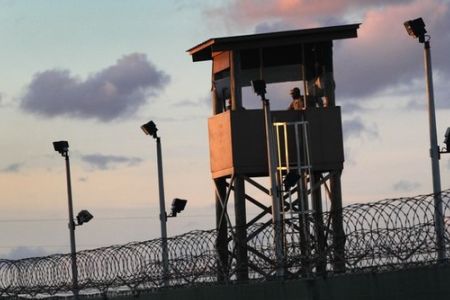Gitmo detainees and their families in Yemen chat via video
With the prison camps at Guantánamo approaching their 10th year, the majority Yemeni captive population has just received a new perk: Video conferencing back to family via a new link set up by the International Committee of the Red Cross.
MIAMI — With the prison camps at Guantánamo approaching their 10th year, the majority Yemeni captive population has just received a new perk: Video conferencing back to family via a new link set up by the International Committee of the Red Cross.
The Geneva-based group announced the service's inauguration on Tuesday, saying four Yemeni captives had been allowed to use the teleconferencing this month in calls beamed between the Navy base in southeast Cuba and the nation on the Arabian Peninsula.
Prisoners and family can speak by video for up to an hour, according to a Red Cross statement. It said some detainees and their families can now see and speak to each other "for the first time in almost a decade."
The ICRC had earlier acted as go-between for the captives and their families with "Red Cross Messages." Those are the brief exchanges on official forms that the Pentagon sanctioned soon after it opened the camps on Jan. 11, 2002, provided the military could review each message before delivery.
The U.S. holds 90 Yemenis at Guantánamo, according to the ICRC. They account for the largest nationality among the 174 captives at the prison camps. One is segregated from the rest as a war criminal — former video-maker Ali Hamza al-Bahlul, 41, convicted in late 2008 of being Osama bin Laden's al-Qaida recruiter and propagandist.
The military at Guantánamo would not say whether all Yemeni captives can get video calls — or whether they are rewards in the Pentagon prison camps' compliance matrix.
"I can confirm some of our detainees are Yemenis," said Air Force Lt. Col. Donald Langley, a prison spokesman, refusing to speak to the specifics of the Red Cross announcement.
Some Yemeni captives have already passed their 10th year in U.S. custody, having been scooped up in Afghanistan after the Sept. 11, 2001, attacks and turned over to invading U.S. forces.
Although various review processes spanning two administrations have cleared some of the Yemeni captives for repatriation, the U.S. has yet to reach an agreement with Yemeni President Ali Abdullah Saleh to rehabilitate and monitor any men sent home.
A March 2009 U.S. Embassy cable from Sanaa, made public by WikiLeaks, described Saleh as "alternately dismissive, bored, and impatient" during a 40-minute meeting to resolve the topic with President Obama's counterterrorism czar, deputy national security adviser John Brennan.
At one point, Saleh sought $11 million in U.S. funds to build a rehab facility in the port city of Aden. At another, he suggested that the U.S. house his citizens at the federal Super-Max prison in Florence, Colo.

No comments:
Post a Comment